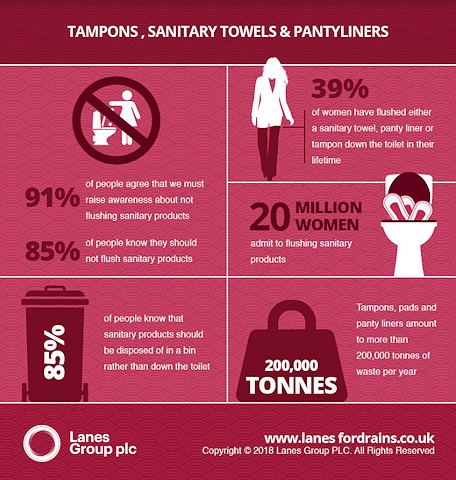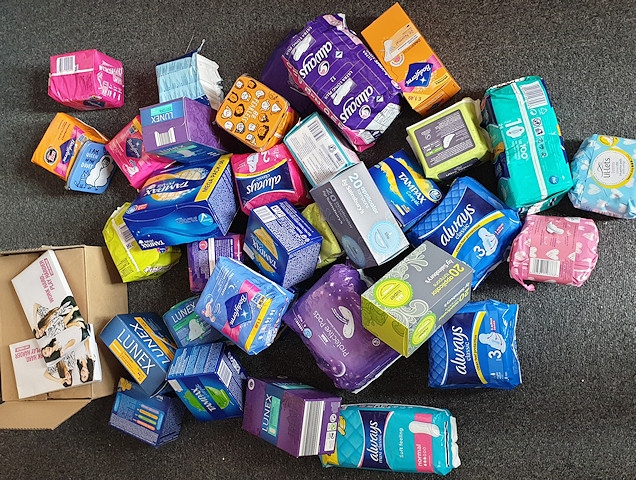Government period poverty plans ‘must go further’ and address eco impact
Date published: 29 March 2019

Statistics from Lanes Group
The government’s pledge to provide free sanitary products in secondary schools does not go far enough to eradicate period poverty and will not solve the environmental crisis of incorrect disposal of sanitary items, says a national drainage firm.
The announcement was made earlier this month as part of the spring statement, following campaigners’ calls for the government to take action on ‘period poverty’ – a lack of access to sanitary necessities due to financial problems.
A survey conducted by Lanes Group in 2018 found more than a third of respondents (39%) have flushed either a sanitary towel, panty liner or tampon down the toilet in their lifetime, despite packaging advice to throw used items in the bin.
According to figures published in the Journal of the Institution of Environmental Science, an estimated 700,000 panty liners, 2.5 million tampons and 1.4 million sanitary pads are flushed down the toilet every single day in the UK, an act which is polluting the nation’s waterways with microplastics.
Most sanitary pads are estimated to be approximately 90% plastic, containing as much plastic as four supermarket carrier bags, whilst tampons can be bought with cardboard or plastic applicators.
It is estimated that it can take over 450 years for plastic-filled sanitary products to decompose with the average woman throwing away over 10,000 disposable menstrual products in her life.
In 2010, a UK beach clean found an average of 23 sanitary pads and 9 tampon applicators per kilometre of British coastline, according to the Women's Environmental Network, whilst the 2018 Great British Beach Clean by the Marine Conservation Society found that 6.2% of litter removed from Britain’s beaches had been flushed down the toilet, rather than being thrown away.

The Lanes Group research also found just 3 per cent of women consider environmental impact when choosing sanitary products, whilst 46 per cent prioritise comfort and 17 per cent believe cost is the most important factor.
Sanitary towels were the most popular option with more than 50% of women saying they use pads more than any other period product, closely followed by tampons, whilst only 3 per cent use eco-friendly menstrual cups and 1 per cent use sanitary underwear.
Eco-friendly reusable options have become more popular in recent years, such as reusable menstrual cups made from medical-grade silicone, tampon applicators, washable cloth sanitary towels and ‘period-proof’ underwear with layers of absorbable fabric and waterproof materials.
When asked whether they agree that people in the UK need to be more aware that sanitary products should not be flushed down the toilet, 63 per cent of survey respondents said they ‘strongly agree’.
Michelle Ringland, Head of Marketing at Lanes Group, said: “It is shocking to hear that many girls are told that the best way to get rid of a used tampon, applicator and wrapper is to flush it down the toilet, when none of these products are biodegradable and either cause blockages such as fatbergs or release microplastics that are released into the waterways and prove fatal to marine life.
“Young girls should be taught about all the options available to them - including eco-friendly products which are increasingly popular - and how best to dispose of sanitary items.”
Anna Stokes, co-ordinator for the Red Box Rochdale project, part of a campaign to ensure that girls and young women don’t miss out on education because of periods, commented: “We are pleased that the government has announced that they are introducing education on menstruating for all students by September 2020 and we hope that this will include educating pupils on environmental factors and how to dispose of products properly.
“We hope that this education will help to break down stigmas and taboos surrounding menstruation.
“We will also continue to raise awareness of different products that are available to girls/women at events we attend, including reusable products.”
The Red Box Project campaign ensures no girl foregoes her education because of her period, providing schools with boxes filled with sanitary pads, tampons and spare underwear so that students will not struggle with affording appropriate menstrual care.
Do you have a story for us?
Let us know by emailing news@rochdaleonline.co.uk
All contact will be treated in confidence.
Most Viewed News Stories
- 1Newhey's Char Steakhouse and Bank Chamber close with immediate effect
- 2Two men arrested after police chase ends up in Middleton river
- 3Man charged in connection with assault on Christmas Eve in Sudden
- 4Failing care home shut by health watchdog following safety concerns
- 5Woman of Rochdale 2024 – Lorenza Pye
To contact the Rochdale Online news desk, email news@rochdaleonline.co.uk or visit our news submission page.
To get the latest news on your desktop or mobile, follow Rochdale Online on Twitter and Facebook.


